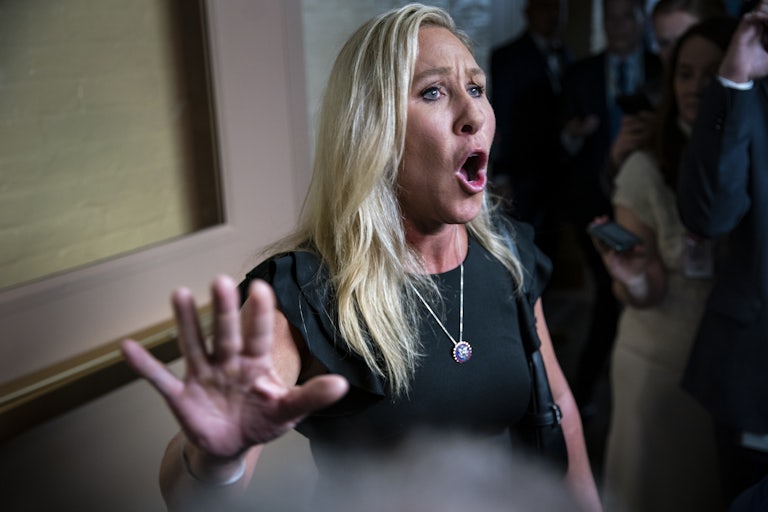What on Earth Was 60 Minutes Thinking With That Majorie Taylor Greene Interview?
This was a masterclass in how not to interview someone on the far right.

Representative Marjorie Taylor Greene has called for a “national divorce”; lied about the 2020 election; spread conspiracy theories about 9/11, the 2018 Parkland shooting, and Jewish space lasers setting forests on fire in California; and repeatedly expressed support for fatal violence against Democrats.
And she was given an open platform on 60 Minutes.
On Sunday, the radical member of Congress joined CBS’s Lesley Stahl for an exclusive and much-promoted interview special, in which the duo were seen walking the halls of Congress and Greene was filmed showing off her CrossFit skills.
Aside from the odd “day in the life” aesthetic of the interview, Stahl’s interview of Greene, and perhaps CBS’s edits of it, displayed a shocking deference to the Georgia congresswoman and her dangerous ideas. One moment in particular embodied the shortcomings of the interview: just enough pushback to show an effort, not enough to prove that the effort meant anything at all.
Stahl asked Greene about things she has said in the past, like: “The Democrats are a party of pedophiles.”
“I would definitely say so,” Greene affirmed. “They support grooming children.”
“They are not pedophiles,” Stahl responded. “Why would you say that?”
“Democrats, Democrats support—even Joe Biden, the president himself, supports children being sexualized and having transgender surgeries,” Greene said. “Sexualizing children is what pedophiles do to children.”
“Wow. OK,” Stahl responded. “But my question really is, why can’t you fight for what you believe in without all that name-calling and without the personal attacks?”
That Stahl was unprepared to more directly confront for a major talking point among Republicans, and that she reduced their attacks on trans kids and gender-affirming care to “name-calling,” speaks volumes about the folly of the entire interview.
After an ensuing back-and-forth about name-calling, Stahl offered to move on. “Let me button this up, and we’ll move on,” she said, before asking about Greene’s hopes to bring America closer to her views, which include instituting a Christian government, banning abortion nationally, defunding the FBI, and stopping immigration for four years.
Stahl focused on the former. “The Constitution, the very First Amendment, prohibits having a religion in the government,” she pointed out.
“Yet the Founding Fathers quoted the Bible constantly and were driven by their faith,” Greene responded, somehow with the production leaving that as the last word.
The interview concludes almost like a foreboding movie trailer.
“As a fervent supporter of the now-indicted Donald Trump, she was a featured speaker at his rally in Waco last weekend. While she’s adored here, the latest national poll has her approval rating at just 29 percent,” a following voice-over read.
A clip of Trump follows.
“Marjorie Taylor Greene, you happened to be here,” Trump says. “Would you like to run for the Senate? I will fight like hell for you, I’ll tell ya.”
“The question for her, and the country, is can she expand her brash MTG brand beyond the right-wing, populist base?” the voice-over finishes.
This half-critical, half-not approach characterized much of the interview. “Before Congress, she helped run the family construction company in Georgia,” the interview’s voice-over read in another part of the special on Greene. It continued, describing her as “known to be smart and fearless and has a history of believing in conspiracy theories.” Why, exactly, she is characterized as “smart”—and by whom—is not completely clear. And in a broader sense, calling Green “smart and fearless” is like calling The Simpsons’ Mr. Burns “resourceful and bold.”
The production overall was too willing to move on, offering mere samplings of Greene’s issues paired with a touch of pushback. It embodied the sort-of journalism that insists on its merit by arguing that the best spokesperson for showing the wrongness of something is itself, rather than another observer explaining why exactly it is wrong. Stahl doesn’t need to actually interrogate the absurdity or danger of something Greene says; she just needs to push back once to show the contrast, and then the viewers can just see for themselves.
In some sense, the production felt like a time-warp back to 2016; the special was a piece built for intrigue, a self-proclaimed holistic examination into someone who is neither intriguing nor enigmatic. And though it should be needless to say, apparently it is not: Providing such room for complexity about someone so simply unfit to represent this country is exactly how we got Donald Trump—and exactly how we’ll keep getting more like him (heck, maybe even more of him).









